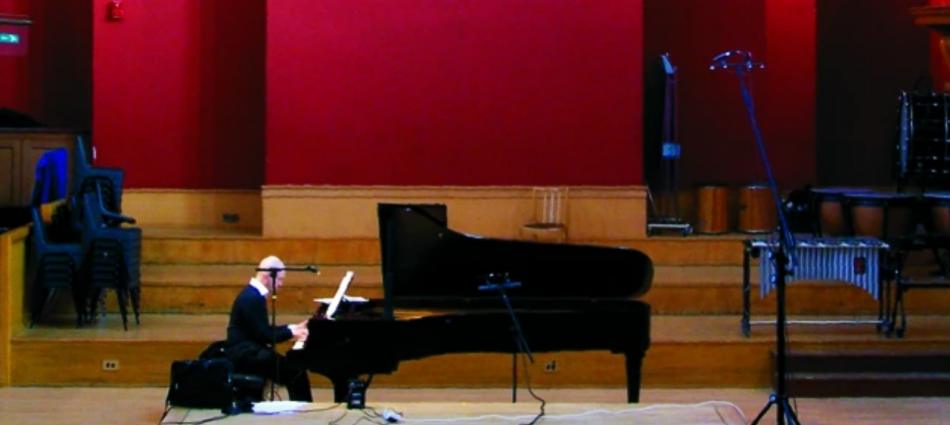Nicholas Ashton, pianist solo, chamber, contemporary piano music

The Conversation, August 2014
https://theconversation.com/why-benjamin-brittens-war-requiem-still-resounds-today-30293
The past may be a foreign country, but in terms of war, they do not do things differently there; death is death at any time and in any language.
No other work in the Classical repertoire could be more topical or appropriate in commemorating the centenary of the Great War than Benjamin Britten’s War Requiem, to be performed at the Edinburgh International Festival at the Usher Hall on August 14 by the Philharmonia Orchestra with Sir Andrew Davis at the helm.
Shostakovich – no stranger to the political statement – considered the work to be the greatest composition of the 20th century, even though, as he died in 1975, one wonders whether anything that came after it (Stockhausen’s helicopters, John Adams’ Nixon or Klinghoffer?) would have changed his mind.
Certainly, the effect on all who were present at the 1962 premiere inaugurating the rebuilt St. Michael’s Cathedral in Coventry, was devastating. The great German baritone soloist, Dietrich Fischer-Dieskau, was reportedly unable to speak after the performance.
The coruscatingly powerful mixture of settings from the Latin Mass for the Dead with nine of Wilfrid Owen’s finest poems, potently delivered by a huge combination of full and chamber orchestras, a full choir, a boys’ choir and three soloists in the cavernous space of the new church, was a spectacle not to be brushed way. It is as though Britten had set out to unleash his most powerful musical thought in creating a work which, in its unequivocally pacifist message, should be as relevant and meaningful in any time.
Pacifism was a stance Britten had always been at great pains to articulate: he had remained in the USA in 1939 at the outbreak of World War II, and returned to Britain in 1942 to face the Tribunal for the Registration of Conscientious Objectors. His response was courageous, if simple; that the useful role of an artist is to create, not to destroy.
In 1945, he travelled with Yehudi Menuhin to witness the liberation of the Bergen-Belsen Concentration Camp and, perhaps influenced by this and by that other monument to Pacifism, Tippett’s A Child of Our Time, he contemplated writing a choral work based upon the atomic attacks on Hiroshima and Nagasaki, to be entitled Mea Culpa, in 1946. This commission did not materialise, however, and it took the space of the intervening 15 years of gestation for the War Requiem finally to emerge.
The principal message of the work is uncompromising, direct and unswerving: it is the denunciation of War, of all wars; in Owen’s own words: “My subject is war, and the pity of war. The poetry is in the pity; all a poet can to today is warn”. It is especially poignant, then, to look back not just at the terrible events which the Requiem specifically commemorates and which at the time – the Cold War at its most tense – served to provide a solemn warning, but also to reflect that even such a powerful, monumental artistic masterpiece can have little practical effect – either permanent or temporary – on any political landscape; during the performance of this work next week, there will be murders in Gaza and Israel, in Ukraine, in Syria.
Beneath this major theme, there are other layers of polemic as carefully nuanced as the actual formal layering of the musical texture. Britten writes as a humanist; that is, one who has stripped away the more artful derivations of humanitarianism to its basic meaning: to be human, to respond as an individual, often in the teeth of popular opposition.
In his speech, given at Aspen, Colorado accepting the Award for Services to Humanity in 1964, Britten begins with an intentionally deceptive and craftsman-like naivete in reference to the simple human circumstances of composing the Requiem; that it was required to be performed in a large, formerly Gothic space necessitating a dramatic polyphonic work in keeping with the resonant acoustic.
He maintains this apparent simplicity in stating that he composes for humans, he appeals directly to the human ear and the human heart: “Music does not exist in a vacuum, it does not exist until it is performed, and performance imposes conditions. It is the easiest thing to write a piece virtually or totally impossible to perform – but oddly enough that is not what I prefer to do; I prefer to study the conditions of performance and to shape my music to them.”
Even more subtly embedded in the Requiem is Britten’s own response both as a Christian (perhaps in the larger sense) and as an outsider, in that his own private emotional and sexual life – at least as a young man – precluded acceptance by socially accepted norms. Indeed, in his decision to set Wilfrid Owen, there would certainly have been a conscious connection, not just with Owen’s brutal denunciation of war, but the poet’s own emotional and sexual outsider-ness; there is a strong, if concealed undercurrent of homoeroticism in much of his work. Here again, one would hope to be able to point to the progress in acceptance and openness, yet there is still Uganda, there is still Russia.
The performance scheduled for the Edinburgh Festival on August 14 could not be presented with greater pedigree; in the form of Sir Andrew Davis, whose magisterial approach to conducting Britten is without peer; to the three marvellously well-chosen singers whose nationalities, Russia in soprano Albina Shagimuratova, Britain in tenor Toby Spence and Germany in baritone Mathias Goerne, mirror Britten’s specific intended nationalities to be represented at the premiere; and to the Philharmonia supported by the National Youth Choir of Scotland directed by Christopher Bell. Whatever one may think of the lasting effect of the work, its resonant, tragic power in a performance of this calibre is unmissable.